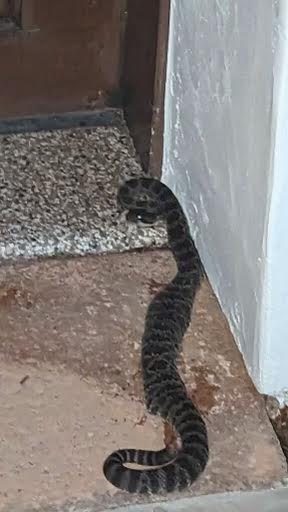
Rattlesnake ‘season’ may have been delayed due to winter’s heavy rains and cooler weather
A Malibu woman is still recovering from a rattlesnake bite despite a three-day hospital stay. On Sept. 14, the Point Dume resident stepped out of her garage to accept an evening food delivery. As the garage door opened and lights turned on the woman says she was bitten before she even saw the snake that may have been startled by the lights. The woman who asked not to be identified so her children wouldn’t worry about her injury says she’s still in pain and has three paralyzed toes.
The Malibu mother described the pain from the bite on her ankle as “excruciating,” however sensing the need to protect her children from the poisonous reptile she was able to fight it off. While in agonizing pain after the sudden bite, she managed to beat the snake to death with a push broom after some minutes of it “hissing” and attempting to bite her again. The whole incident was captured on her home’s security cameras.
The bite victim ignored her pain and swelling in her leg because she didn’t want to miss volunteer work the next morning, but after a fever, sweats, and extreme swelling, her friends urged her to seek medical treatment. They drove her to a local urgent care that then recommended she be hospitalized. Even though she’s been home for a week, doctors are unsure if her partial paralysis will cease.
Although snakebites are not uncommon in Malibu, it appears if there is a snake “season,” it may have shifted. According to Lee Kats, interim dean at Seaver College at Pepperdine University, there’s no hard and fast rule.
“We’re in an unusual environment because while we have a mild climate year-round, we have a winter period where the evenings are cold,” Kats said. “If the evenings are cold snakes pretty much become inactive because they are cold blooded or ectotherms.”
The professor of biology said that in wintertime we shouldn’t be seeing snakes, but, “If there’s a warm spell which can happen in Malibu any time, our snakes don’t go into a sedentary state deep enough. We certainly see periods of increased activity in spring, summer, and fall. It doesn’t surprise me. We’ve had some very warm days last week. As long as there are warm days our reptiles are going to be active.”
“The Western Pacific rattlesnake tends not to be a super aggressive venomous snake,” Kats continued. “That’s a good thing we have going for us, but they are pit vipers, meaning they are sensitive to infrared heat signals. At night, they are often either responding to a threat or they’re responding to a signal they picked up that a warm-blooded animal, their typical prey, has just walked in front of them.”
Although the recent Malibu snakebite victim powered through without seeking medical attention for hours it is recommended to call 911 after a venomous snake bite, especially if the bitten area changes color, swells, or is painful, as that means the venom is damaging tissue.
Dr. Dana DePerno of Malibu Coast Animal Hospital sees snakebites yearly at her veterinary practice, although, she said, “They started much later this year (April being our first case) because of the rain and cooler weather. In 2022 our first case was in February and the season extended to November because it was dry/hot. Our most recent snakebite was last week.
“I encourage people to avoid hiking with their pets in the heat of the day to avoid snakes as well as overheating,: DePerno said. “If bitten, it is recommended that you get your pet SAFELY to treatment. The most serious cases we’ve treated are those that have come in overheating because the owners ran them down the hill and into the car to the hospital. I recommend keeping pets on-leash when hiking in the hills and highly recommend rattlesnake aversion training which is typically held locally several times throughout the summer season.
“For pets with risk of exposure, we do recommend the rattlesnake vaccine, which generates antibodies to the venom as a first line of defense. This buys time to get safely to treatment. Rattlesnake vaccinated dogs receive the same treatment protocol as unvaccinated dogs, but tend to have less severe reactions in my experience.”
The rattlesnake vaccines typically are effective for about six months. As we’ve seen, snakebites don’t necessarily happen only on hiking trails.
The rattlesnake vaccine is not currently available for cats.
